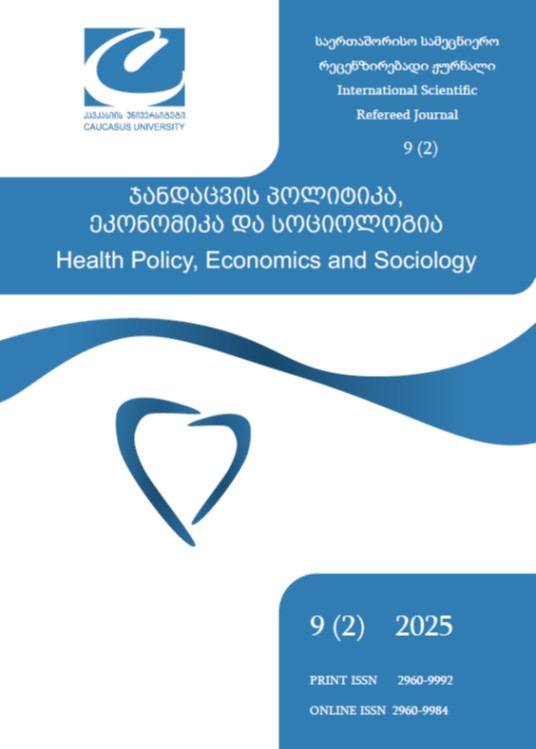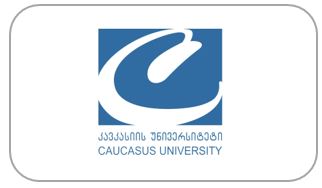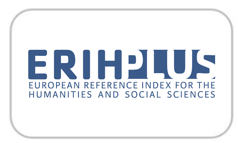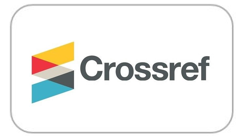ძილის დარღვევის კავშირი ნეირონების დაზიანებასთან. მიკროგილიისა და გლიის გააქტიურებით განპირებული მექანიზმების მიმოხილვა
DOI:
https://doi.org/10.52340/healthecosoc.2025.09.02.04საკვანძო სიტყვები:
ნეირონების დაკარგვა, მიკროგლია, ოქსიდაციური სტრესი და ექსციტოტოქსიკურობა, ანთება, ნეიროდეგენერაცია, ძილის უკმარისობაანოტაცია
შესავალი: უძილობა სწრაფად ხდება ნეიროდეგენერაციის დაჩქარების კრიტიკული ფაქტორი, რადგან იგი ცნობილია როგორც კოგნიტური უნარების დაქვეითებისა და ნეიროდეგენერაციის ერთ-ერთი მთავარი მიზეზი. ეს მიმოხილვა იკვლევს ხანგრძლივი ფხიზლობის, მიკროგლიის აქტივაციისა და ნეირონული დაზიანების შორის რთულ ურთიერთობას. განხილულია გლიური უჯრედების მიერ მართულ იმუნურ პასუხთა ცენტრალური როლი ძილის დანაკლისით გამოწვეულ ტვინის პათოლოგიებში, სხვადასხვა კვლევის მონაცემებზე დაყრდნობით. მეთოდები: ჩატარდა კომპლექსური ლიტერატურის მიმოხილვა PubMed, Scopus და Google Scholar-ის გამოყენებით. შესწავლილი იქნა 2011-2022 წლებში გამოქვეყნებული რეცენზირებული, ღია წვდომის მქონე ინგლისურენოვანი სტატიები. მიმოხილვა აჩვენებს, თუ როგორ მართავს მიკროგლია ანთების, ოქსიდაციური სტრესისა და ექსციტოტოქსურობის მექანიზმებს სტრესის პირობებში, რაც საბოლოოდ იწვევს სინაფსურ და ნეირონულ დანაკარგს. განხილულია მიკროგლიის დისფუნქციის რამდენიმე გამომწვევი ფაქტორი, მათ შორისაა TREM2-ით დამოკიდებული ამილოიდ-ბეტას კლირენსის დარღვევა და CRH-ის გავლენა ჰიპოთალამო-ჰიპოფიზურ-თირკმელზედა ღრუს (HPA) ღერძის გააქტიურებაზე. აგრეთვე, ასტროციტებსა და მიკროგლიას შორის ორმხრივი კავშირი ცხადყოფს, თუ როგორ უწყობს გლიური გადატვირთვა ხელს ლიზოსომული დისფუნქციისა და ქრონიკული ანთების განვითარებას. შედეგები: მიმოხილვამ გამოავლინა სარწმუნო მტკიცებულებები, რომლებიც აჩვენებს, რომ ძილის დანაკლისი უკავშირდება მიკროგლიის გააქტიურებას, პროანთებითი ციტოკინების გაძლიერებულ გამოყოფასა და ოქსიდაციურ სტრესს — რაც ხელს უწყობს ნეირონული და სინაფსური დაზიანებას. კვლევებმა აჩვენა, რომ TREM2-ის სიგნალიზაციის დარღვევა ამილოიდ-ბეტას კლირენსის დაქვეითებას იწვევს, მაშინ როცა HPA ღერძის ჰიპერაქტივაცია აძლიერებს მიკროგლიის მედიირებულ ნეიროანთებას. ასტროციტებისა და მიკროგლიის შორის კოაქტივაციამ ხანგრძლივი ფხიზლობის პირობებში გაზარდა ლიზოსომული დისფუნქცია და ქრონიკული ანთება. ეს პროცესები განსაკუთრებით თვალსაჩინო იყო ალცჰაიმერის დაავადების მოდელებში, სადაც ძილის დარღვევამ დააჩქარა ამილოიდური ფოლაქების დაგროვება და ტაუ პათოლოგიის განვითარება. გლიური მოდულაციისა და გლიმფატიკური ფუნქციის გაუმჯობესების მიმართულებით ექსპერიმენტულმა ჩარევებმა აჩვენეს პოტენციური ნეიროპროტექტორული ეფექტები. განხილვა: მიგნებები წარმოაჩენს მიკროგლიის დისფუნქციის გადამწყვეტ როლს უძილობის ნეიროპათოლოგიურ შედეგებში. ქრონიკული ძილის დანაკლისი ააქტიურებს გლიური იმუნური რეაქციებს, არღვევს ნარჩენების გაწმენდის მექანიზმებს და ქმნის ანთებით გარემოს, რომელიც ხელს უწყობს სინაფსურ დაშლასა და ნეირონულ დაზიანებას. ეს მექანიზმები განსაკუთრებით აქტუალურია ნეიროდეგენერაციულ დაავადებებში, როგორიცაა ალცჰაიმერის დაავადება, სადაც გლიური რეგულაციის დარღვევა კორელაციაშია ფოლაქების დაგროვების დაჩქარებასა და ტაუ პათოლოგიასთან. დასკვნა: ეს მიმოხილვა კიდევ ერთხელ უსვამს ხაზს უძილობის როლს როგორც ნეიროდეგენერაციის მოდიფიცირებად რისკ-ფაქტორს, რომელიც მოქმედებს გლიური დისრეგულაციის გზით. მიკროგლიური და ასტროციტული გზების მოდულაცია, გლიმფატიკური გაწმენდის გაუმჯობესება და ოქსიდაციური სტრესის შემცირება შეიძლება გახდეს პერსპექტიული ნეიროპროტექტორული სტრატეგიები. აუცილებელია შემდგომი ტრანსლაციური კვლევები ეფექტიანი კლინიკური ინტერვენციების განვითარებისთვის.
წყაროები
1. Colonna M, Butovsky O. Microglia Function in the Central Nervous System During Health and Neurodegeneration. Annu Rev Immunol. 2017 Apr 26;35:441-468. doi: 10.1146/annurev-immunol-051116-052358. Epub 2017 Feb 9. PMID: 28226226; PMCID: PMC8167938. https://pmc.ncbi.nlm.nih.gov/articles/PMC8167938/
2. Qin J, Ma Z, Chen X, Shu S. Microglia activation in central nervous system disorders: A review of recent mechanistic investigations and development efforts. Front Neurol. 2023 Mar 7;14:1103416. doi: 10.3389/fneur.2023.1103416. PMID: 36959826; PMCID: PMC10027711. https://pmc.ncbi.nlm.nih.gov/articles/PMC10027711/
3. Worley SL. The Extraordinary Importance of Sleep: The Detrimental Effects of Inadequate Sleep on Health and Public Safety Drive an Explosion of Sleep Research. P T. 2018 Dec;43(12):758-763. PMID: 30559589; PMCID: PMC6281147. https://pmc.ncbi.nlm.nih.gov/articles/PMC6281147/
4. Atrooz F, Salim S. Sleep deprivation, oxidative stress and inflammation. Adv Protein Chem Struct Biol. 2020;119:309-336. doi: 10.1016/bs.apcsb.2019.03.001. Epub 2019 Apr 24. PMID: 31997771. https://www.sciencedirect.com/science/article/abs/pii/S187616231930029X?via%3Dihub
5. Cai Y, Liu J, Wang B, Sun M, Yang H. Microglia in the Neuroinflammatory Pathogenesis of Alzheimer's Disease and Related Therapeutic Targets. Front Immunol. 2022 Apr 26;13:856376. doi: 10.3389/fimmu.2022.856376. PMID: 35558075; PMCID: PMC9086828. https://pmc.ncbi.nlm.nih.gov/articles/PMC9086828/
6. Nicosia N, Giovenzana M, Misztak P, Mingardi J, Musazzi L. Glutamate-Mediated Excitotoxicity in the Pathogenesis and Treatment of Neurodevelopmental and Adult Mental Disorders. Int J Mol Sci. 2024 Jun 13;25(12):6521. doi: 10.3390/ijms25126521. PMID: 38928227; PMCID: PMC11203689. (Nicosia et al, 2024) https://pmc.ncbi.nlm.nih.gov/articles/PMC11203689/
7. Bellesi M, de Vivo L, Chini M, Gilli F, Tononi G, Cirelli C. Sleep Loss Promotes Astrocytic Phagocytosis and Microglial Activation in Mouse Cerebral Cortex. J Neurosci. 2017 May 24;37(21):5263-5273. doi: 10.1523/JNEUROSCI.3981-16.2017. PMID: 28539349; PMCID: PMC5456108. https://pmc.ncbi.nlm.nih.gov/articles/PMC5456108/
8. Xin J, Wang C, Cheng X, Xie C, Zhang Q, Ke Y, Huang X, Chen X, Pan X. CX3C-chemokine receptor 1 modulates cognitive dysfunction induced by sleep deprivation. Chin Med J (Engl). 2021 Nov 3;135(2):205-215. doi: 10.1097/CM9.0000000000001769. PMID: 34732662; PMCID: PMC8769116. https://pmc.ncbi.nlm.nih.gov/articles/PMC8769116/
9. Zhou Y, Ulland TK, Colonna M. TREM2-Dependent Effects on Microglia in Alzheimer's Disease. Front Aging Neurosci. 2018 Jul 9;10:202. doi: 10.3389/fnagi.2018.00202. PMID: 30038567; PMCID: PMC6046445. https://pmc.ncbi.nlm.nih.gov/articles/PMC6046445/
10. Parhizkar S, Gent G, Chen Y, Rensing N, Gratuze M, Strout G, Sviben S, Tycksen E, Zhang Q, Gilmore PE, Sprung R, Malone J, Chen W, Remolina Serrano J, Bao X, Lee C, Wang C, Landsness E, Fitzpatrick J, Wong M, Townsend R, Colonna M, Schmidt RE, Holtzman DM. Sleep deprivation exacerbates microglial reactivity and Aβ deposition in a TREM2-dependent manner in mice. Sci Transl Med. 2023 Apr 26;15(693):eade6285. doi: 10.1126/scitranslmed.ade6285. Epub 2023 Apr 26. PMID: 37099634; PMCID: PMC10449561. https://pmc.ncbi.nlm.nih.gov/articles/PMC10449561/#ABS2
11. Guo L, Reed KM, Carter A, Cheng Y, Roodsari SK, Martinez Pineda D, Wellman LL, Sanford LD, Guo ML. Sleep-Disturbance-Induced Microglial Activation Involves CRH-Mediated Galectin 3 and Autophagy Dysregulation. Cells. 2022 Dec 30;12(1):160. doi: 10.3390/cells12010160. PMID: 36611953; PMCID: PMC9818437. https://pmc.ncbi.nlm.nih.gov/articles/PMC9818437/
12. Ahmadian N, Hejazi S, Mahmoudi J, Talebi M. Tau Pathology of Alzheimer Disease: Possible Role of Sleep Deprivation. Basic Clin Neurosci. 2018 Sep-Oct;9(5):307-316. doi: 10.32598/bcn.9.5.307. Epub 2018 Sep 1. PMID: 30719245; PMCID: PMC6360494. https://pmc.ncbi.nlm.nih.gov/articles/PMC6360494/
13. Murdock MH, Yang CY, Sun N, Pao PC, Blanco-Duque C, Kahn MC, Kim T, Lavoie NS, Victor MB, Islam MR, Galiana F, Leary N, Wang S, Bubnys A, Ma E, Akay LA, Sneve M, Qian Y, Lai C, McCarthy MM, Kopell N, Kellis M, Piatkevich KD, Boyden ES, Tsai LH. Multisensory gamma stimulation promotes glymphatic clearance of amyloid. Nature. 2024 Mar;627(8002):149-156. doi: 10.1038/s41586-024-07132-6. Epub 2024 Feb 28. PMID: 38418876; PMCID: PMC10917684. https://www.nature.com/articles/s41586-024-07132-6
14. Carvalhas-Almeida C, Serra J, Moita J, Cavadas C, Álvaro AR. Understanding neuron-glia crosstalk and biological clocks in insomnia. Neurosci Biobehav Rev. 2023 Apr;147:105100. doi: 10.1016/j.neubiorev.2023.105100. Epub 2023 Feb 17. PMID: 36804265. https://www.sciencedirect.com/science/article/pii/S0149763423000696
15. Wisor JP, Schmidt MA, Clegern WC. Evidence for neuroinflammatory and microglial changes in the cerebral response to sleep loss. Sleep. 2011 Mar 1;34(3):261-72. doi: 10.1093/sleep/34.3.261. PMID: 21358843; PMCID: PMC3041702. https://pmc.ncbi.nlm.nih.gov/articles/PMC3041702/
16. Hu Y, Wang Y, Wang Y, Zhang Y, Wang Z, Xu X, Zhang T, Zhang T, Zhang S, Hu R, Shi L, Wang X, Li J, Shen H, Liu J, Noda M, Peng Y, Long J. Sleep Deprivation Triggers Mitochondrial DNA Release in Microglia to Induce Neural Inflammation: Preventative Effect of Hydroxytyrosol Butyrate. Antioxidants (Basel). 2024 Jul 12;13(7):833. doi: 10.3390/antiox13070833. PMID: 39061901; PMCID: PMC11273532. https://pmc.ncbi.nlm.nih.gov/articles/PMC11273532/
17. Hristovska I, Robert M, Combet K, Honnorat J, Comte JC, Pascual O. Sleep decreases neuronal activity control of microglial dynamics in mice. Nat Commun. 2022 Oct 21;13(1):6273. doi: 10.1038/s41467-022-34035-9. PMID: 36271013; PMCID: PMC9586953. https://pmc.ncbi.nlm.nih.gov/articles/PMC9586953/
18. Griffin P, Dimitry JM, Sheehan PW, Lananna BV, Guo C, Robinette ML, Hayes ME, Cedeño MR, Nadarajah CJ, Ezerskiy LA, Colonna M, Zhang J, Bauer AQ, Burris TP, Musiek ES. Circadian clock protein Rev-erbα regulates neuroinflammation. Proc Natl Acad Sci U S A. 2019 Mar 12;116(11):5102-5107. doi: 10.1073/pnas.1812405116. Epub 2019 Feb 21. PMID: 30792350; PMCID: PMC6421453. https://pmc.ncbi.nlm.nih.gov/articles/PMC6421453/














